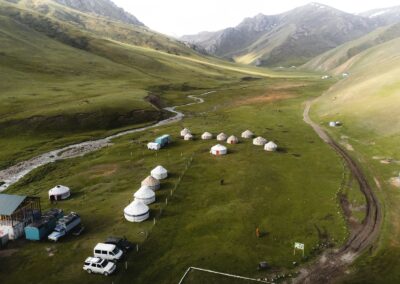Innovative Applications of Augmented Reality in Tourism
The Emergence of AR Travel Guides
AR travel guides represent a significant leap forward in how travelers explore and engage with destinations. These guides leverage AR technology to overlay digital information onto the real world, providing an immersive and informative experience for users. This innovative approach is particularly beneficial in regions like Saudi Arabia and the UAE, where tourism is a vital economic sector, and cities like Riyadh and Dubai are at the forefront of technological adoption.
One of the primary advantages of AR travel guides is their ability to offer real-time, context-aware information. Unlike traditional travel guides, which rely on static text and images, AR guides can provide dynamic content that responds to the user’s location and actions. For instance, as a tourist explores the historic sites of Riyadh, an AR travel guide can display information about the site’s history, cultural significance, and interesting facts directly on their smartphone or AR glasses. This not only enhances the visitor’s experience but also makes learning more engaging and interactive.
Moreover, AR travel guides can personalize the travel experience based on user preferences and behaviors. By analyzing data such as past travel history, interests, and social media activity, AR guides can tailor recommendations to suit individual travelers. This level of personalization ensures that visitors get the most out of their trips, discovering hidden gems and activities that align with their interests. In the UAE, where cities like Dubai are known for their diverse and vibrant attractions, personalized AR travel guides can significantly enhance the tourist experience, encouraging repeat visits and positive reviews.
Innovative Examples of AR Travel Guides
Several pioneering AR travel guides have emerged, setting new standards in the tourism industry. One notable example is the “City Guide Tour,” an AR app that provides tourists with interactive tours of major cities around the world. Users can point their smartphones at landmarks to receive detailed information, historical context, and even virtual reconstructions of ancient structures. This app has been particularly successful in cities with rich historical heritage, such as Rome and Athens, but its application in places like Riyadh and Dubai can provide tourists with a deeper understanding of the region’s unique cultural and historical significance.
Another innovative AR travel guide is the “Pocket Tour Guide,” which uses AR to offer guided tours without the need for a physical tour guide. The app includes a variety of pre-recorded tours that users can follow at their own pace. As they walk through different locations, the app uses AR to highlight points of interest and provide audio commentary. This self-guided approach is ideal for travelers who prefer exploring independently while still gaining insightful information. In bustling tourist destinations like Dubai, where tourists often seek flexible and convenient travel solutions, the “Pocket Tour Guide” can enhance their experience by offering an accessible and informative guide on-demand.
The “AR City” app is another example that stands out in the tourism industry. This app provides a comprehensive AR experience by combining navigation, local information, and social interactions. Users can navigate through cities using AR overlays that show directions and points of interest. Additionally, the app integrates social features, allowing travelers to share their experiences, leave reviews, and even find nearby friends. In the context of Saudi Arabia and the UAE, where social connections and community engagement are highly valued, “AR City” can facilitate a more connected and enriched travel experience.
The Impact of AR Travel Guides on the Tourism Industry
The introduction of AR travel guides has had a profound impact on the tourism industry, offering numerous benefits to both travelers and destinations. One of the most significant impacts is the enhancement of visitor engagement and satisfaction. By providing interactive and immersive experiences, AR travel guides can make sightseeing more enjoyable and memorable. This increased engagement can lead to higher visitor satisfaction rates, which in turn can boost tourism revenue and promote positive word-of-mouth marketing.
AR travel guides also offer valuable insights for destination management and marketing. The data collected through these apps can provide tourism authorities with detailed information about visitor behavior, preferences, and feedback. This information can be used to optimize tourism strategies, improve visitor services, and develop targeted marketing campaigns. In cities like Riyadh and Dubai, leveraging AR travel guides can help tourism boards better understand their audience and tailor their offerings to meet the evolving needs of travelers.
Furthermore, AR travel guides can contribute to the preservation and promotion of cultural heritage. By providing detailed information about historical sites and cultural landmarks, these guides can raise awareness and appreciation for a region’s heritage. In Saudi Arabia and the UAE, where preserving cultural identity is of paramount importance, AR travel guides can play a crucial role in educating visitors and fostering a deeper connection to the local culture.
Conclusion: The Future of AR in Tourism
AR travel guides are revolutionizing the tourism industry by offering interactive, personalized, and immersive experiences. Their ability to provide real-time information, personalize recommendations, and enhance visitor engagement makes them an invaluable tool for modern travelers. In regions like Saudi Arabia and the UAE, where tourism is a key economic driver, adopting AR technology can significantly enhance the travel experience, attracting more visitors and boosting tourism revenue.
The innovative examples of AR travel guides, such as “City Guide Tour,” “Pocket Tour Guide,” and “AR City,” demonstrate the potential of this technology to transform the way we explore and interact with destinations. As AR technology continues to evolve, we can expect even more sophisticated and engaging travel guides that cater to the diverse needs of global travelers. For business executives, mid-level managers, and entrepreneurs in the tourism industry, embracing AR travel guides offers a pathway to innovation, growth, and success in the competitive landscape of modern tourism.
—
#ARTravelGuides, #AugmentedReality, #TourismIndustry, #InnovativeAR, #SaudiArabia, #UAE, #Riyadh, #Dubai, #ArtificialIntelligence, #Blockchain, #Metaverse, #ExecutiveCoaching, #GenerativeAI, #ModernTechnology, #BusinessSuccess, #Leadership, #ManagementSkills, #ProjectManagement























